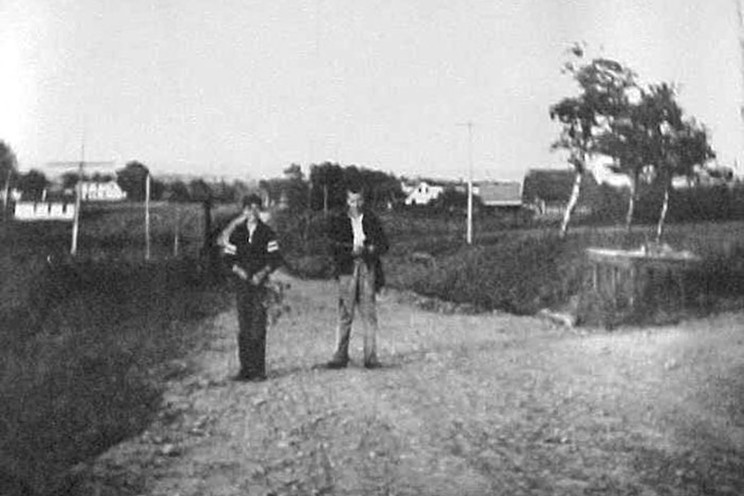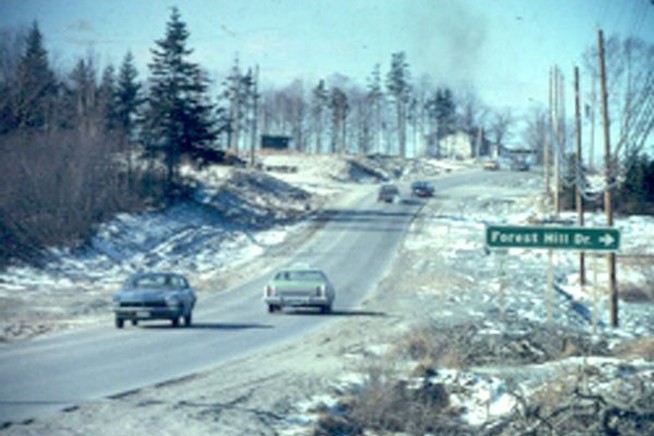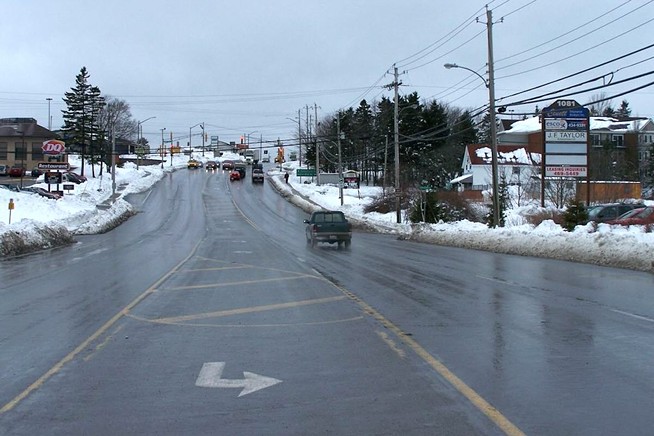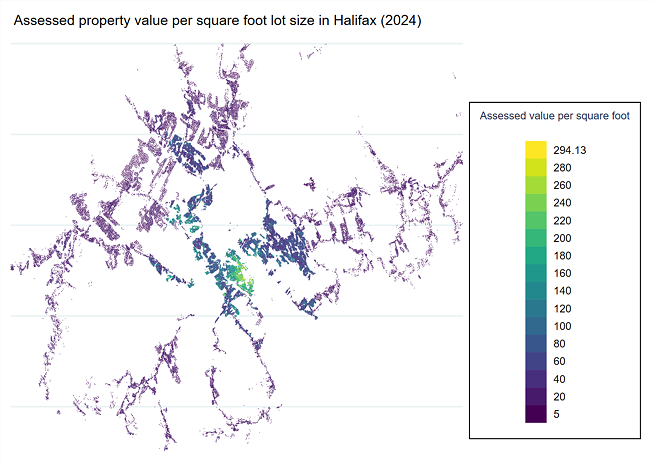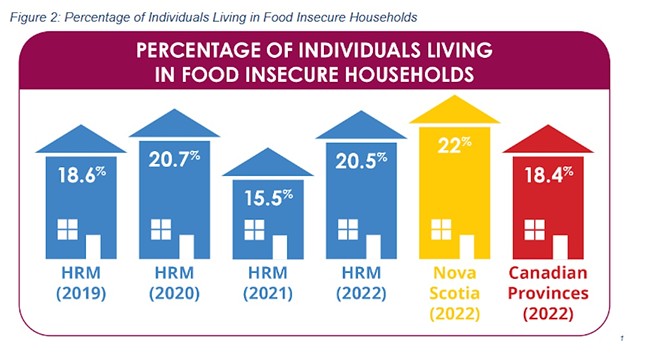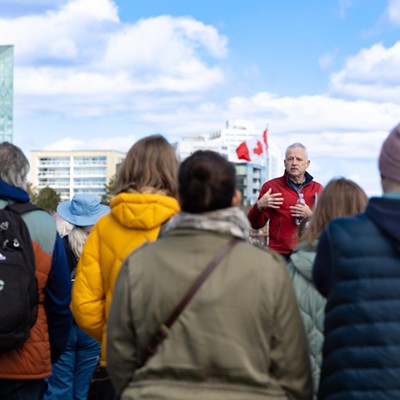Tuesday’s council meeting was dominated by food—specifically the fact that Halifax is in a bit of a pickle because it doesn’t produce much. But council couldn’t dig into the meat and potatoes of that debate right away, they had to do a tip of the hat and flipping of the bird before getting to work on the bread and butter of their agenda.
All of the councillors, except the absent Sam Austin, wore a Hawaiian shirt and baseball hat for the meeting. This was in tribute to the local radio legend Rick Howe, who passed away last week at the age of 69. Councillor Lisa Blackburn, a former colleague of Howe’s, put on her best radio voice and paid respects to Howe on behalf of council.
This Feb. 6 meeting also featured the rare presentation of a petition to council. Councillor Paul Russell tabled a petition from over 500 of his residents who don’t want the pallet shelters in Lower Sackville. He said that most of the people in his district want to help the unhoused people, although the sincerity of that statement was completely undercut by said petition asking to pre-emptively evict people without homes.
Things that passed
The city is going to start a complete community plan for the area in and around the Bedford Commons. Suzanne Rent did a writeup of the report. We shall see what comes back as this is still quite early in the process, but it was approved to continue.
The Sackville Heights Community Centre operating agreement has been renewed.
The city will consider spending the $522,000 required to add part B to the JustFOOD action plan (part B is the functional implementation component of the plan). Part A of the plan was coming up with a second part to address food insecurity in Nova Scotia, as provincial and federal governments consistently and repeatedly fail us. This spending will now be added to the budget adjustment list for consideration as part of this year’s budget. If approved, this money is going to set up a five-year food strategy. A lot more on the history of Halifax’s food in the Notable Debates section below.
Rural transit operators like MusGoRider are going to have an increase in funding, along with more predictable funding.
Halifax is going to be able to do hybrid meetings moving forward. The cost to the city is $155,000 in order to avoid, for example, residents of Sheet Harbour driving almost 250 kilometers to speak for five minutes at city council. North West Community Council will get a hybrid something at some point, but it needs its own technology solution.
The Lake Banook Master Plan will get a revamp next meeting. This was deferred as councillor Austin was absent from this meeting. After next meeting, this will likely come come back in July.
The city is making a minor change to its investment policy. We will now be comparing our investments with national treasury bills every three months.
The massive addition built onto/around the heritage house at 2539 Agricola Street got approved by council.
The city’s 2024/25 capital plan was up for approval from council. This piece of the budget goes before the rest of the business units so the city can put out tenders for capital projects. If this specific budget waits for the rest of the business units’ budgets to be finished (end of April), there wouldn’t be enough time for the tender process to happen before construction season. This passed, so expect tender population to proliferate now that we are officially in municipal-service-provider mating season.
Councillor Pam Lovelace successfully requested a staff report to update the HRM’s private road policies. Since roads are a money sink and the city doesn’t maintain them, a bunch of private roads are falling into unusable disrepair (this is what unsustainable looks like). The city has a policy not to allow construction on private roads, so that homeowners don’t get caught with this maintenance burden. Since private road development applications are generally rubber-stamped at committee, this issue continues to grow. There are also roads in the city that are owned by no one, that might have been owned by the province at one point. Regardless, this is an interesting motion because it’s a plan to make roads equitable. This is not really possible to do with a piece of infrastructure that costs so much, so it’s possible this motion starts the process of revamping municipal thinking on roads. Or we’ll change nothing and keep hemorrhaging money on roads.
Lovelace also got some FOIPOP requests for information back from the Department of Natural Resources and RCMP, which she’s included here for city staff’s consideration in making the Wildland Urban Interface Preparedness Strategies.
There was also a memo attached to this agenda for a Parks and Recreation Department budget increase. The city could be making HRM summer camps (which are awesome) more inclusive, but they are struggling to find staff to do it. They want to bump up the pay to make working for the city more desirable and hopefully poach some ECE-type people from other underpaid work.
Notable Debates
Halifax is a city that is food insecure and some of us are starving. This came up a lot in the debates about the JustFOOD program. The city’s food program is trying a lot of things in hopes of course correcting for a past decision to make Halifax food insecure. This decision—building the Macdonald Bridge and thereby making rural areas ripe targets for suburban sprawl—started in 1952 and ended on April 2, 1955, and it has had dire consequences ever since.
During Tuesday’s presentation by staff, councillors learned that Halifax was a lot more food secure until the 1960s and ‘70s, when the expansion of suburbs into fertile farmland really took hold. This transformation is something that’s better shown than described, so here’s Beck’s Hill in the 1940s, 1979 and 2009, all from the community stories project of the Cole Harbour Heritage Farm.
Ultimately the promise of this growth was that it would create an economic boom, and the things we were losing, like farmland, could be replaced with the new windfalls of growth. But since we started this new development pattern post-World War II, the evidence has borne out that this development pattern is actually a Ponzi scheme, and growth has not paid for growth. In fact, thanks to local transportation advocate Kevin Wilson, we can see that the growth of the 1970s has led to large swaths of the HRM being not worth a lot of money, relatively s peaking.
T he lack of food and lack of fiscally sustainable growth has the city of Halifax in a double bind. The low-density sprawl of Cole Harbour has created an issue where low land values and the high maintenance burden of inefficient development mean the city has extremely limited revenue to fix past mistakes, like getting rid of most of its farmland for suburbs. On top of that, these past mistakes are compounded as councillors lack the political will to change the city as drastically as their post-war predecessors did.
City councillors pointed out that food is the purview of the province or the feds, and that the city, if it undertook the JustFOOD program, would be expanding the role of the municipal government. But what are councillors going to do? Let people starve because Justin Trudeau and Tim Houston are bad leaders? Maybe, because councillors decided to send JustFOOD’s $522,000 price tag to the budget adjustment list, to give them more time to go through the program to ensure this spending is actually in the best interest of the HRM.
JustFOOD has a bunch of initiatives that are trying to claw back food production capability. If councillors give the okay, the HRM may start investing in community garden plots, a food council, urban orchard and forestery resources for citizens to learn how to plant and grow food-producing trees. Fruit trees will be coming to more HRM parks. The city will start teaching people and giving kits to people to learn how to compost with worms. The city is trying to start a landsharing program, where lazy people with land can be matched up with land-lacking gardeners. A community grocery store pilot, grants for food producers and emergency food trucks all may be coming to the HRM if councillors approve this spending in April.
This is something that is desperately needed because people in Nova Scotia are starving. We are national leaders in both the child and general poverty categories. We are national leaders in food insecurity.
Councillors will need to decide in April whether or not they want to continue to boldly lead Haligonians as national leaders of poverty and despair. Or, maybe if we are lucky, this year may be the year when councillors finally find their grown-up pants and start taking responsibility for the generations of bad planning that occurred prior to their elections. Or they’ll continue to be cowards and continue to waste more money on the status quo. Here’s to hoping councillors decide to finally listen to the mountains of evidence and start investing in solutions, like food security, instead of wasting our money on things that harm and kill us, like building out suburbs in Cole Harbour.

